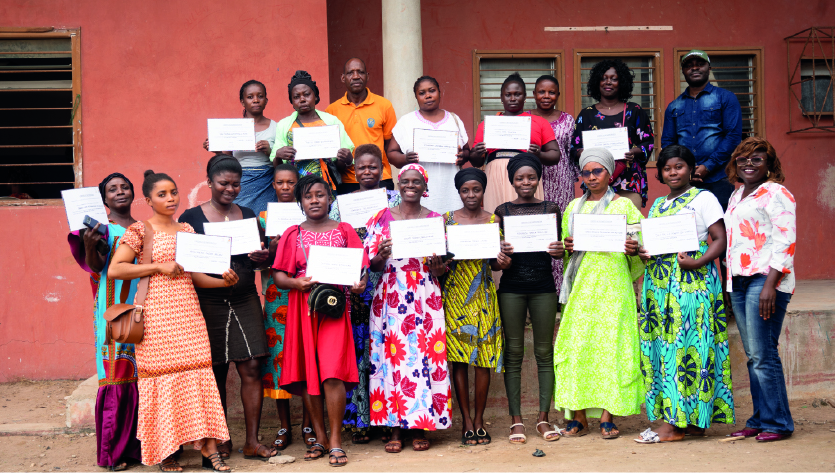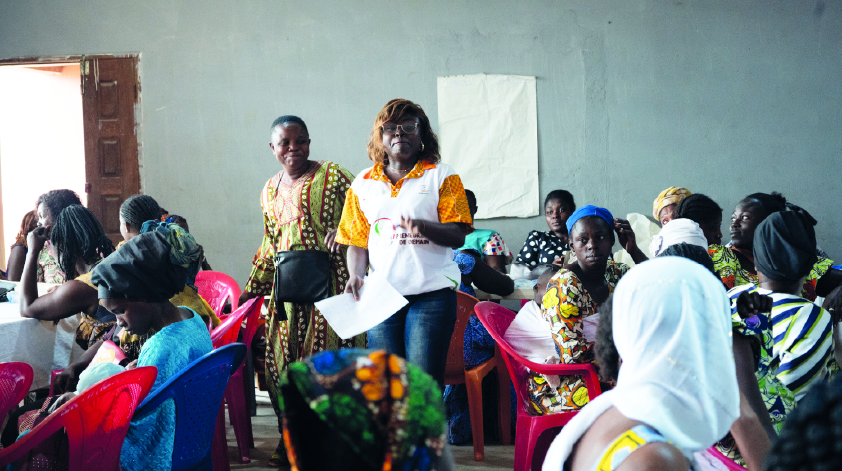Founded in 2016, Incub’Ivoir has rapidly established itself as a key player in innovation in agricultural value chains in Côte d’Ivoire. In partnership with the Enabel’s Trade for Development Centre, the incubator has strengthened its marketing and project management skills, while developing a service offering that responds to the specific challenges of the sector. We took stock of TDC’s support and the organisation’s projects with Hermann Kouassi, director, Maurane Conand, project manager, and Francis Akotia, head of the Yamoussoukro hub.
Could you briefly describe Incub’Ivoir and its objectives?

Hermann Kouassi: Incub’Ivoir is an incubator for innovative projects based in Côte d’Ivoire. Founded in 2016, our mission is to support project holders to turn their business ideas into reality. Since 2020, Incub’Ivoir has decided to specialise in the structuring of agricultural value chains. To this end, we have had the opportunity to work on the cocoa, cassava and plantain value chains thanks to a GIZ (German Agency for International Cooperation) project.
Our offer is based on two main areas. The first is economic structuring, through our incubator and accelerator. The idea is to help project leaders create structured, viable businesses. The second is to raise awareness among smallholder producers about entrepreneurship and the management of their agricultural assets, with a particular focus on women and young people. To this end, we conduct itinerant activities throughout Côte d’Ivoire to reach as many beneficiaries as possible.
We also advise donors and companies on their projects and services.
What has TDC helped you achieve?
Hermann Kouassi: When we applied for support in 2019, we were really at a turning point. Once we were selected, we worked with the two TDC coaches, Maxime Bacq and Valérie Vangeel, on our strategic positioning, clarifying our vision and defining our areas of work. The coaching helped us to accelerate our specialisation in the agricultural sector. If we hadn’t had it, we might have been been groping around for our model.
It also gave my partner and me the opportunity to develop a different management style so that Incub’Ivoir could really grow.
We were also able to take advantage of a €30,000 grant from the TDC, which enabled some of the team to attend training courses in project management and communication.

Maurane Conand: The support we received helped us to become more professional. We worked on practical aspects such as tools and processes related to project scoping and the creation of a toolbox for setting up projects and responding to calls for tenders. This toolbox, which we have continued to develop, is still in use today.
Our strategy and vision have become much clearer. We know better where we’re going and how to get there. This makes it easier for us to engage as team members because we have a better understanding of what is expected of us on a day-to-day basis. Our guidelines allow us to respond to calls for projects in a targeted way. We’re less likely to get lost and we don’t have to respond to calls that don’t fall within our remit. It has certainly clarified a lot of things. New tools and a much clearer vision are not bad enough.
Francis Akotia: Maxime and Valérie’s support has been very important at a strategic level and has been integrated into all our programmes. Thanks to their support, we have been able to design our different support programmes and the activities to be included in the different modules with precision.
The project approach developed with them has enabled us to better frame our activities as an incubator, improve our internal monitoring and strengthen the collaboration within our team. We have integrated elements of benevolence and tools that we can replicate with our beneficiaries, helping them to adopt strategic approaches in their businesses.
This has led to a huge increase in the skills of each individual and a commitment to a strategic vision for the business beyond 2020. So it’s been working quite well for four years now.
Have you been able to win new contracts thanks to this support?
Hermann Kouassi: TDC’s support enabled us to win a number of tenders. It came at the right time to prepare for phase 2 of the project we were implementing for GIZ and enabled us to bring it to a successful conclusion. This structuring has really boosted our competitiveness and our ability to offer cutting-edge services to our beneficiaries.
Today, we can see the increased capabilities of our teams. GIZ appreciates our work and the project has been extended until 2025.

You work for Enabel on cooperative governance. What exactly do you do?
Hermann Kouassi: We responded to a call for projects from Enabel to support the governance of cooperatives. Today, despite the OHADA law, most cooperatives in Côte d’Ivoire do not operate according to the cooperative model as in the West, with real cooperation, voting rights and collective decision-making by all members. This is a real obstacle to its development and to the autonomy of its members.
Our aim is to present and explain the cooperative model. In a cooperative there are rights, but there are also duties. Every member has a say, and there are procedures to follow for financial and organisational management.
We have to rethink a lot of things. In Côte d’Ivoire, a cooperative is very often the business of a single individual who simply brings producers together to buy and sell raw materials such as cocoa. Through our work with Enabel, we want to give cooperative members more autonomy and clarify the role of managers.
How many cooperatives do you support?
Hermann Kouassi: We are supporting five cooperatives as part of a three-year programme, with face-to-face sessions lasting one week every six months. That’s six sessions over three years.

What do you think about the current rise in cocoa prices? What is the impact on farmers?
Hermann Kouassi: Today in Côte d’Ivoire, despite the recent increase in the price of cocoa from 1,000 to 1,500 FCFA, the impact on producers is limited. This is because Ivorian cocoa is sold forward and the 2024 season has already been sold. We are therefore working on the 2025 season. Even when prices rise, as they are now, producers don’t feel the immediate impact.
We have been assured that prices have stabilised for growers and that if prices fall, they will receive a guaranteed income from the government. This is important because we can see from our activities on the ground that the FCFA 1,000 does not allow producers to live a decent life.
What difficulties might a cooperative face as a result of the 50% increase in the price paid to producers?
Francis Akotia: The main impact is on cash flow. To buy a tonne of cocoa, you used to need 1 million francs; now you need 1.5 million. So you have to be able to mobilise significant financial capacity to buy the cocoa you need. Capital has become essential. And the cooperatives are also asking for their margin of 80 FCFA to be increased so that they can be better remunerated as economic actors.
Are there any tools to help cooperatives get the liquidity they need to buy beans?
Hermann Kouassi: No, and the “pisteurs” are back in full swing. Some of the cocoa is being sold by the cooperatives in parallel, hoping to get some money and be able to function. In reality, this problem has not been solved and it is beginning to weigh on the producers, who are often members of cooperatives committed to a system of sustainability. Joining a system of sustainability means that the producer has to make an effort and invest even before starting production.
In addition, many growers have used chemical fertilisers to guarantee a certain level of productivity. Today, the negative effects of these fertilisers are being felt, not least as a result of climate change, leading to under-productivity. For example, a producer with two hectares may only produce 500 kilos, or even less than one tonne. Even at a cocoa price of 4,000 FCFA, this is not profitable. This problem is exacerbated by the ageing of the plantations. To ensure sustainable cocoa, it is essential to address these problems upstream before tackling the price issue.

At the World Cocoa Conference, some experts questioned whether productivity could be increased significantly, especially given the impact of climate change and disease. What do you think of the target of 1,000 kilograms per hectare? Is it a daydream?
Hermann Kouassi: Indeed, achieving this objective is not easy. It’s important to underline this. In discussions with cocoa farmers, it appears that the majority of their orchards are over 20 years old and have been treated with chemical fertilisers, which has degraded the quality of the soil. Soil regeneration is therefore a major challenge and will require significant investment to restore soil fertility.
In addition, all the work done by the international community to combat child labour has led to a shortage of labour, as many farmers can no longer rely on their children to work in the fields. These are issues that the World Cocoa Organisation should be able to address.
From 1 January 2025, new European Union regulations will apply to combat imported deforestation. Have you developed activities to help cooperatives geolocate plots of land and set up traceability systems?
Hermann Kouassi: We have developed a project called ‘Agir pour l’agriculture’ (Acting for agriculture), which is now a year old, but we have not yet been able to implement it. This project concerns not only cocoa, but the entire agricultural sector. It involves mapping and surveys.
Today, we want to be able to address the issue of land tenure with farmers and other agricultural stakeholders. The farmers’ activities are not very formal. They are not trusted anywhere, except when it comes to taking their goods when they are needed. But after that, in the whole process, he disappears, he’s under the radar. We’d like to help him geolocate his land and see if a land title, an administrative document that gives economic value to that land, can be issued. From there, we can work with them, first to help them formalise their business, then to establish links with banks, and finally to facilitate access to the market. But we haven’t found any takers for our programme yet, because it’s not something that’s going to happen in 2 or 3 years, it has to be a long-term process.
Many cooperatives now want to start processing cocoa beans into cocoa mass, and even go as far as making chocolate. What do you think about this?
Hermann Kouassi: It’s not because all the cooperatives are going to start processing cocoa that they’re going to improve their incomes, because Ivorians are not the biggest consumers of chocolate. Besides, I’ve tasted some of the chocolate made by cooperatives and it’s really nothing like the chocolate made in the West. We shouldn’t force people to do anything. But why not make cocoa butter, or nibs for cattle feed, or coated beans? There is a market for these intermediate products that add value.

What are the challenges and opportunities facing Incub’Ivoir today?
Hermann Kouassi: The first challenge is to enable the companies involved in our programmes to be sustainable. So we’re going to facilitate their access to the market and to finance. The second challenge is more structural. It is about structuring the whole value chain, from production to processing and marketing.For example, how can we provide a better framework for cooperatives so that they can supply good quality raw materials to a processor, who in turn can go to a manufacturer or have direct access to the market?
Our second challenge is to develop an experimentation centre for raw material processing, where we will be a real provider of solutions for producers and other entrepreneurs.
Finally, our third challenge is to support our entrepreneurs in their international expansion.
Interview by Samuel Poos, Project Manager of the Trade for Development Centre at Enabel.


